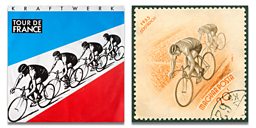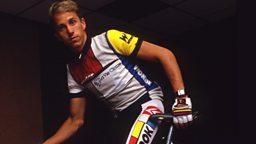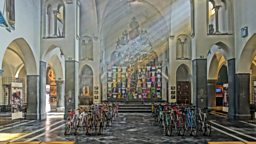Be-spoke creations: Five cycling-related works of art
6 July 2018
The sport of cycling and the epic, sweeping narratives of its great races have inspired writers and artists for decades. Ahead of the 2018 edition of the Tour de France, TOM CHURCHILL looks at five ways cycling has collided with the world of the arts.

Tour de France, by Kraftwerk
German synth-pop pioneers Kraftwerk are famously as fanatical about cycling as they are about synthesisers, and this 1983 single is their musical love letter to the world’s greatest bike race.
Its iconic sleeve shows the band on bikes in racing formation, and is adapted from the design of a Hungarian postage stamp from 1953, issued to mark the opening of the Népstadion (People's Stadium) in Budapest.
Of the recording, co-founder Ralf Hütter said: "We were inspired by recording breath and heartbeat and other sounds from bikes. We are very interested in the dynamics and the energy and the movement."
- Kraftwerk on cycling, 3D and Detroit (rollingstone.com)
La Vie Claire's Mondrian-inspired jersey
Looking stylish on a bike isn’t easy. Pro riders may have the anatomy to pull off the unforgiving Lycra of racing clothing, but the chances are their team kit will be an eye-watering mess of sponsor logos. Having the name of a budget supermarket emblazoned across your backside isn’t the strongest look.
But it wasn’t always this way. Back in the mid-80s, French team La Vie Claire sported an eye-catching geometric design inspired by Piet Mondrian’s Composition with Red Blue and Yellow.
It was worn by superstars Greg LeMond and Bernard Hinault in the 1986 Tour de France, which the team utterly dominated and which American LeMond went on to win. Having the most stylish jersey in the peloton can’t have hurt.

The Rider, by Tim Krabbe
No novel sums up the experience of bike racing more beautifully than this semi-autobiographical masterpiece by Dutch author and journalist Tim Krabbe, a former chess master who took up competitive cycling in his thirties.
Across 148 pages of elegant, gripping and often caustically funny prose, he recounts the exploits of a fictional ‘Tim Krabbe’ in the Tour de Mont Aigoual amateur race in the south of France in the late summer of 1977.
It offers a glimpse into the masochistic psyche of the cyclist, such as in this oft-quoted passage: “After the finish all the suffering turns into memories of pleasure, and the greater the suffering, the greater the pleasure. That is Nature's payback to riders for the homage they pay her by suffering.”
- The real meaning of a cult classic (bicycling.com)

The Koers Museum of Cycle Racing
As the home of Spring Classic races such as the Tour of Flanders, and the motherland of the greatest racing cyclist of all time, Eddy Merckx, Belgium is arguably more fanatical about bikes than any other nation – and it has a cycling museum to match.
Ahead of a grand reopening in Roeselare in September following an extensive refurbishment, the museum recently staged a remarkable exhibition at the town’s Paterskerk church, entitled Koers is Religie (Cycling is a Religion).
The exhibits included a giant steel cross made from old bikes, a shrine to Merckx, and a video loop of Lance Armstrong owning up to Oprah Winfrey about his doping... playing inside a confession booth.
- National Cycling Museum (cyclinginflanders.cc)

Time Trial, featuring David Millar
It’s been a while since a documentary captured the essence of cycle racing from the inside. The classics of the genre – Jorgen Leth’s The Stars and the Water Carriers, about the 1973 Giro d’Italia, and A Sunday in Hell, about the 1976 Paris-Roubaix – are now more than four decades old, and recent films have tended to focus on doping scandals, such as Alex Gibney’s The Armstrong Lie, and Bryan Fogel’s Oscar-winning Icarus.
Former racer David Millar should change that with the long-awaited release this summer of Time Trial, which follows him through his troubled final season in the saddle. Directed by Finlay Pretsell, it features immersive, mesmerising footage from inside the peloton, along with his distinctive voiceover describing the suffering and pain in unsparing detail.
Millar is now one of the most prominent voices in modern cycling, thanks both to his writing – his book Racing Through the Dark is a searing and honest account of his doping ban and subsequent rebirth as anti-doping campaigner – and his commentary on ITV4’s coverage of the Tour de France.
- Time Trial UK screening details (timetrialfilm.com)
The Art of Sport
-
![]()
Tennis reads
Eight titles with a tennis twist to enjoy this summer.
-
![]()
Beautiful game
Creating amazing art through the prism of football.
-
![]()
Creative knockout
Five amazing works inspired by boxers.
-
![]()
Be-spoke creations
Five ways cycling has collided with the world of the arts.
More from BBC Arts
-
![]()
Picasso’s ex-factor
Who are the six women who shaped his life and work?
-
![]()
Quiz: Picasso or pixel?
Can you separate the AI fakes from genuine paintings by Pablo Picasso?
-
![]()
Frida: Fiery, fierce and passionate
The extraordinary life of Mexican artist Frida Kahlo, in her own words
-
![]()
Proms 2023: The best bits
From Yuja Wang to Northern Soul, handpicked stand-out moments from this year's Proms








